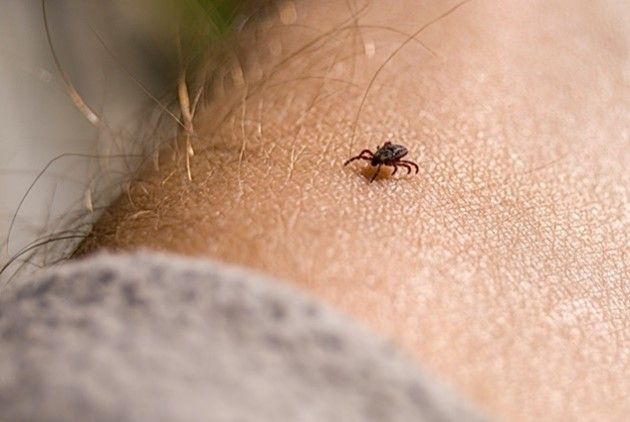Bringing Vaccine Science to Tick-Borne Diseases
While the world, including Pfizer, has been focused on vaccines for COVID-19, we have not lost sight of the many other diseases that continue to affect people globally. In 2021, a key focus for us continued to be working to help prevent certain tick-borne diseases, which are increasingly prevalent across North America and Europe. As people’s interest in spending time outdoors in nature increases,1 whether on vacations or closer to home, helping to protect against diseases caused by certain ticks has become even more important.
Vaccination is available, in certain markets, to help protect people from some harmful diseases that can be a risk while spending time outdoors, such as tick-borne encephalitis (TBE).2 However, for Lyme disease, another prevalent tick-borne infection, there is currently no approved vaccine for humans.3 That’s something we’re aiming to change through one of our collaborations.
Targeting Lyme disease with VLA15
Lyme disease is an infection caused by Borrelia burgdorferi bacteria, which is transmitted to humans by infected Ixodes (deer) ticks.4 Despite a high number of infections, there are currently no available vaccines to help prevent Lyme disease,3 which is why we are committed to addressing this important public health need.
In April 2020, we announced a collaboration with Valneva,5 a specialist vaccine company focused on infectious diseases, to develop and commercialize a Lyme disease vaccine candidate VLA15, which is currently in Phase 2 clinical trials. As of November 15, 2021, Pfizer assumed responsibility from Valneva for the Investigational New Drug Application (IND) for VLA15 with the U.S. Food and Drug Administration (FDA).
VLA15 is the only active Lyme disease vaccine candidate currently in clinical development. This investigational vaccine uses an established mechanism for Lyme disease vaccines, targeting the outer surface protein of B. burgdorferi. VLA15 was granted Fast Track designation by the FDA in July 2017,6 and has demonstrated strong immune system response and safety data in pre-clinical and clinical studies so far. “The prevalence and geographic reach of Lyme disease is growing, underscoring the major medical need for vaccination against the disease,” said Kathrin U. Jansen, Ph.D., Senior Vice President and Head of Vaccine Research & Development at Pfizer. “We are proud to continue the development efforts in our quest to potentially protect people from Lyme disease in the future.”

Phase 2 clinical trials for VLA15 are ongoing, and we are working closely with Valneva on the next development steps.
TicoVac™ reaches a new milestone 45 years on
Meanwhile, we continue to bring our tick-borne encephalitis (TBE) vaccine, TicoVac, to where it’s needed most.
TBE is a rare but serious viral infection of the brain and spine,7 most commonly transmitted to humans through the bite of an infected tick.2 It can be a serious condition with possible long-term consequences.7,8 To date, ticks infected with the TBE virus have been reported in more than 30 countries across Europe and in Japan.2
There are a number of steps an individual can take to help protect themselves from TBE when in a risk area, such as applying effective insect repellent and wearing long-sleeved clothing.9 However, according to the World Health Organization, vaccination is considered the most effective prevention measure for TBE.10

Infected ticks have the potential to cause a number of diseases in humans, including tick-borne encephalitis (TBE) and Lyme disease.
In August 2021, 45 years after its first approval in Austria under the brand name FSME-Immun®, TicoVac was approved by the FDA for active immunization to prevent TBE in individuals one year of age and older.11 TicoVac is currently the only FDA-approved vaccine to help protect U.S. adults and children against the TBE virus when visiting or living in TBE-endemic areas. Many people may benefit from TicoVac, including military troops stationed abroad.
“This vaccine has helped to protect millions of people in TBE-endemic regions since its first approval outside the U.S. 45 years ago,” said Nanette Cocero, Ph.D., Global President of Pfizer Vaccines. “We are proud to deliver the first vaccine to help protect people in the U.S. against TBE if they are traveling to any risk areas, so they are able to spend time outdoors without worrying about the impact of this potentially serious disease.”
Booking.com. Booking.com predicts the top trends for the future of travel. October 2020. https://partner.booking.com/en-gb/click-magazine/bookingcom-predicts-top-trends-future-travel. Accessed December 3, 2021.
Dobler G, Erber W, Bröker M, Schmitt HJ, eds. The TBE Book. 4th ed. Singapore: Global Health Press; 2021. https://tbenews.com/tbe/. Accessed December 3, 2021.
U.S. Centers for Disease Control and Prevention. Lyme disease. Why is CDC concerned with Lyme disease? https://www.cdc.gov/lyme/prev/vaccine.html. Accessed December 3, 2021.
Stanek G et al. Lyme Borreliosis. The Lancet. 2012;379:461–473.
Valneva and Pfizer Joint Press Release. Valneva And Pfizer Announce Collaboration To Co-Develop And Commercialize Lyme Disease Vaccine, VLA15. https://investors.pfizer.com/investor-news/press-release-details/2020/Valneva-and-Pfizer-Announce-Collaboration-to-Co-Develop-and-Commercialize-Lyme-Disease-Vaccine-VLA15/default.aspx. Accessed December 3, 2021.
Valneva Press Release. Valneva Receives FDA Fast Track Designation for its Lyme Disease Vaccine Candidate VLA15. https://valneva.com/press-release/valneva-receives-fda-fast-track-designation-for-its-lyme-disease-vaccine-candidate-vla15/. Accessed December 3, 2021.
Kaiser R. Tick-borne encephalitis. Infect Dis Clin North Am. 2008;22(3):561-75.
Lindquist L, et al. Tick-borne encephalitis. The Lancet. 2008;371:1861–1871.
Travel Health Pro. Country information. Tick borne encephalitis. https://travelhealthpro.org.uk/disease/173/tick-borne-encephalitis. Accessed December 3, 2021.
World Health Organization Regional Office for Europe & European Centre for Disease Prevention & Control. Tick-borne encephalitis in Europe. https://www.ecdc.europa.eu/sites/portal/files/media/en/healthtopics/vectors/world-health-day-2014/Documents/factsheet-tick-borne-encephalitis.pdf. Accessed December 3, 2021.
U.S. Food and Drug Administration. TICOVAC Prescribing Information. http://labeling.pfizer.com/ShowLabeling.aspx?id=15600. Accessed December 3, 2021.


